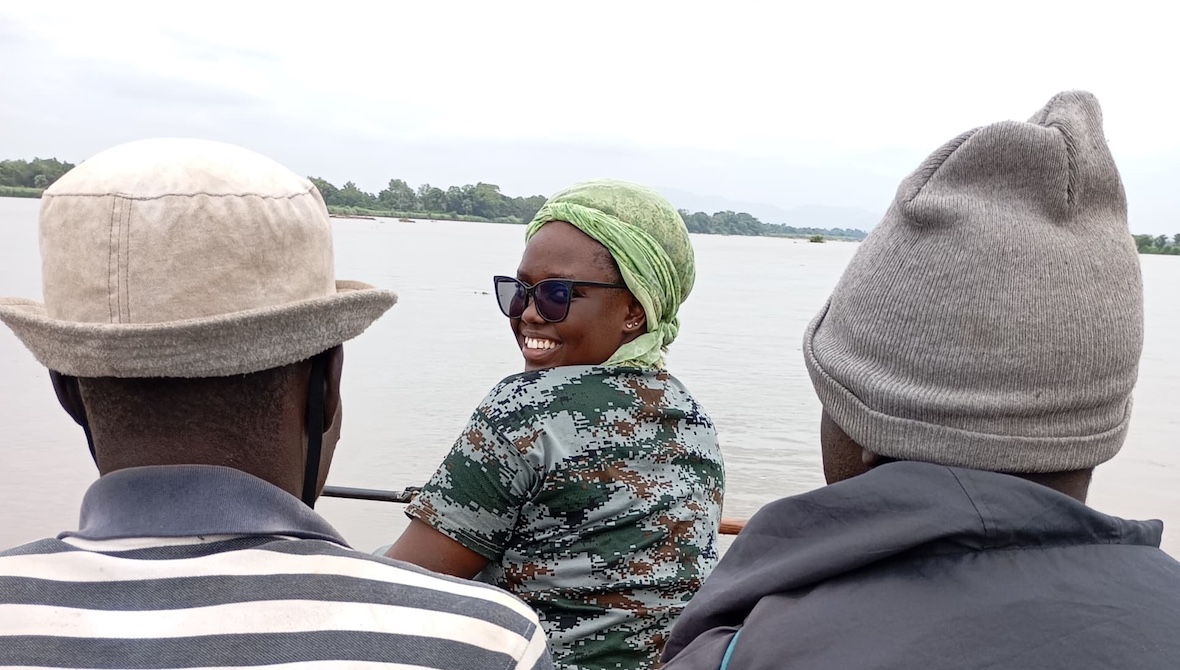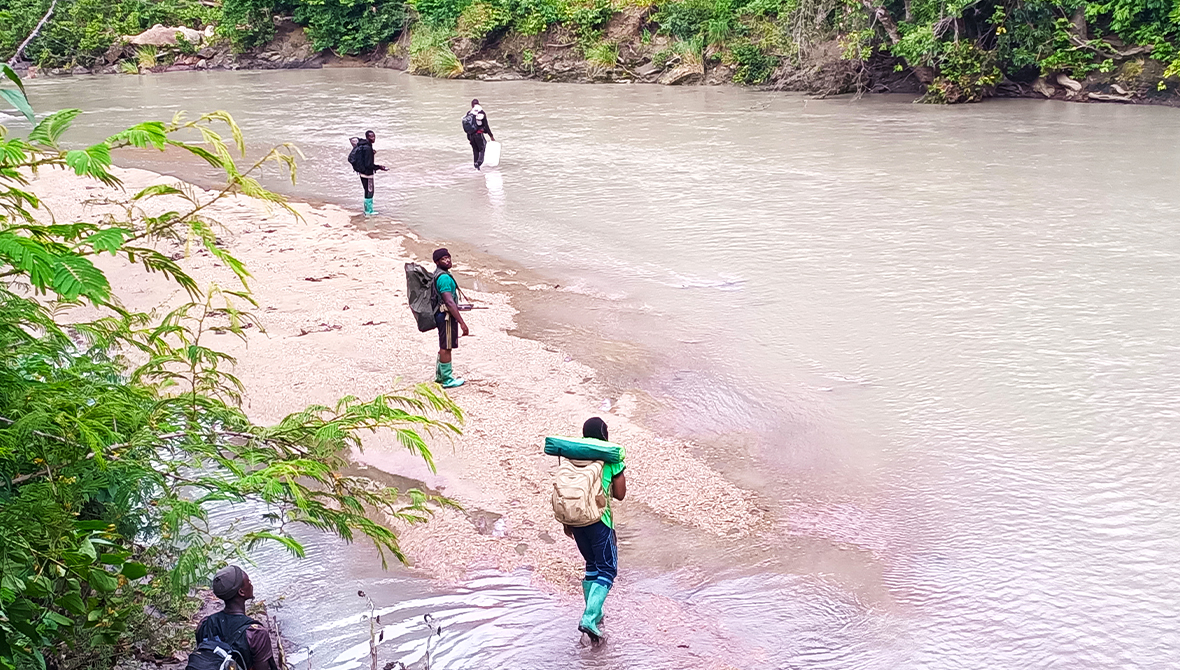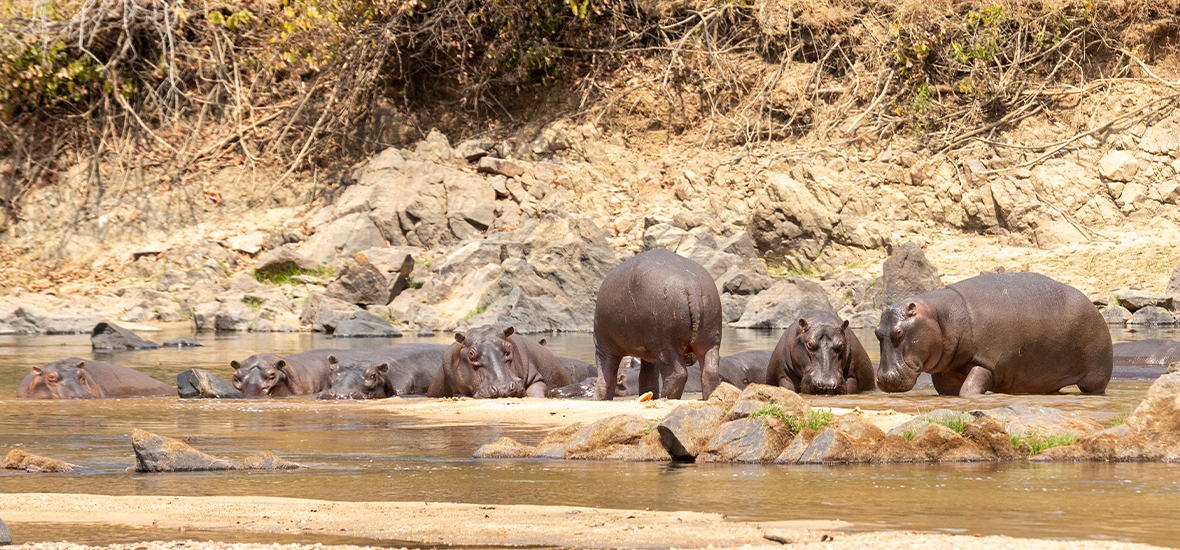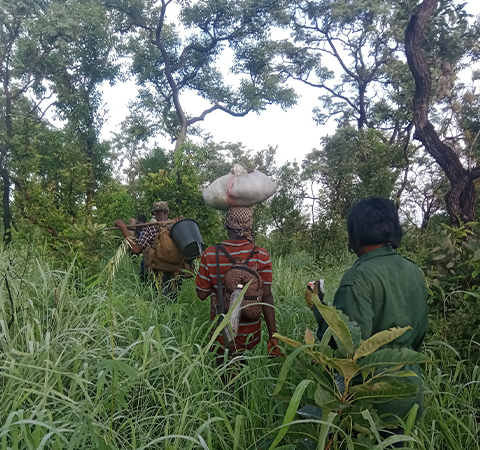Empowering the Next Generation of Conservation Leaders: Maeva Tene's Journey in Cameroon’s Faro National Park

Maeva on her first crossing of Faro river to collect data. ©AWF
Maeva Tene’s journey into conservation was not one born of coincidence, but of legacy. As a child, she watched her father, a sport hunting guide, return from his expeditions. He would proudly show her photographs of his successes and display the trophies that symbolized his adventures. It was in these moments, filled with the awe and wonder of the natural world, that Tene’s passion for conservation took root. Though her father’s work celebrated the challenges of nature, Tene saw the urgent need to protect it, shaping the path she would walk in her adulthood. Now, years later and as an adult, a deep sense of contentment sits within her as she looks back at her journey.
In July 2024, Tene, a student at the Garoua Wildlife School, joined a team of rangers and staff from the African Wildlife Foundation (AWF) to conduct a critical wildlife survey within Cameroon's Faro National Park (FNP) during her academic internship.

WILDLIFE SURVEYORS DURING A TRANSECT IN CAMEROON’S FARO NATIONAL PARK.
This wildlife survey in Faro National Park was essential for understanding the park's diversity and the challenges each species faces. By identifying which species call the park home and the threats they face, the survey helped in creating conservation strategies that will ensure that these species thrive for years to come.
The survey, facilitated by AWF with funds from the European Union, was part of the ongoing conservation efforts within the Faro landscape.
At 24 years old, Tene, who was amongst the youngest in the team of surveyors, took up the challenge of entering this vast wilderness, gathering important information under scorching sun and in relentless rain. This survey was more than just a mere exercise for her. It served as a foundation for her dissertation, using the experiences and data collected to support her pursuit of an engineering degree in Protected Area Management at the Garoua Wildlife School. Each step she took was a symbol of her determination to protect nature and to pursue her dream of becoming an engineer in protected area management.
"Every day was tough, but I reminded myself why I was there—to make a difference for the park's remarkable wildlife," Tene recalled.
Faro can be unforgiving to visitors. It's not just the dry heat. It's the terrain, the inaccessibility of most of it. The torrential rains, whose drops hit the dusty ground with audible thuds. Yet, all these combine to provide a certain addictive charm to the wild land and wildlife that cry out for protection.

Cameroon's Faro National Park hosts the largest hippo population in the region. ©AWF/Ariel Gakunga
Leading the Charge for Biodiversity Protection
Each field day commenced before dawn, as Tene and the survey team meticulously prepared their equipment and mapped out the day’s survey locations.
With her boots securely fastened, she accompanied the engineers in protected area management, community scouts, and AWF team across challenging terrain, covering extensive distances of between 10 kilometers (6.2 miles) and 15 kilometers (9.3 miles).
The role demanded precision and unwavering concentration. As the team progressed along the predefined transects, Tene diligently observed, documented, and recorded her findings with care and accuracy. A lot rested on the accuracy of the data collated by the survey team. There was little room for error.
“Sometimes I saw the animals; sometimes I relied on indirect signs such as tracks, scat, or far-off calls. I was being trained to read the signs of the forest—the snap of a twig, the droppings, the path. The park was telling us a story, and we were being asked to listen," Tene recalled.

Community members and forest guards carried out the survey together in July 2024.
Building a Future Through Collaboration
Tene's work during the wildlife survey provided vital data that gave a glimpse into the kinds of species inhabiting Faro National Park.
This information plays an important role in putting forward proper conservation measures, especially for endangered species. Other data, such as species numbers, provide clues into population trends within the park.
"Knowing that the data we collected will be used for conservation efforts in decades to come made every struggle worthwhile," said Tene.
The African Wildlife Foundation plays a crucial role in supporting efforts like Tene's mission in Faro National Park. By funding and collaborating with ecoguards, community scouts, and future conservationists like Tene, AWF works to empower local communities and strengthen biodiversity protection initiatives across Africa.
With dedication to training and equipping the next generation of conservation leaders, AWF's mission aligns seamlessly with Tene's journey, highlighting how shared goals and teamwork can ensure the sustainability of Africa's natural heritage for generations to come.
Inspiring Africa’s Conservation Leaders of Tomorrow
For Tene, the survey experience provided moments of learning and personal growth that made her experience memorable. She was also intrigued by nature in Faro, including the scenic Mayo Deo.
"Experiencing the landscapes of Faro and seeing the border village made me realize how close people and nature are. It was an eye-opening experience," she said.
A couple of months after the survey, Tene successfully defended her dissertation on the inventory of large and medium-sized mammals in Faro National Park, marking a significant milestone in her academic pursuit.
The path she has chosen in her quest to become an engineer in protected area management might not be an easy one. But now, she knows the journey will not be lonely.
"I met people who were as passionate about conservation as I am. Working with them showed me that conservation is a collaborative effort," she says.
The survey was not only a breakthrough for Tene but also a moment of pride for the African Wildlife Foundation.
Jean-Paul Belinga, AWF's Biomonitoring Officer in charge of the survey, underscored the impact that young people such as Tene have in shaping the agenda of the conservation of Africa's natural heritage
"When you see someone like Tene, you know the future of conservation is in good hands. Tene approached the fieldwork with an unimaginable level of commitment. Her energy and concentration helped make the wildlife survey a success,” Belinga said. “She's an example of what the next generation of conservation leaders can achieve.”